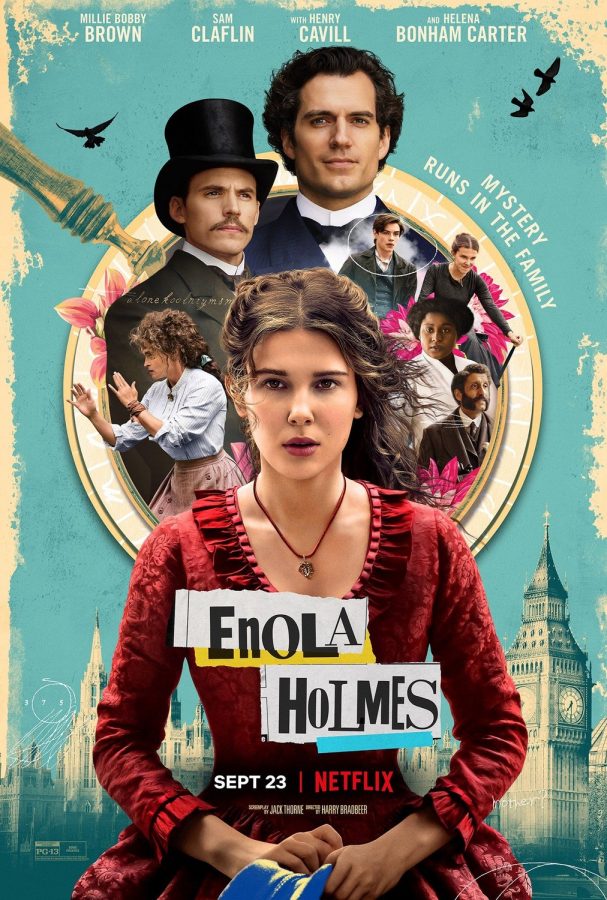Netflix’s new original film Enola Holmes is an empowering movie, and an honest attempt at reimagining the franchise, but falls flat for several reasons. It’s clear why the movie was made, but the execution really confuses the vision. Before we get into it, here’s a recap:
Enola Holmes is the younger sister of the famous detective Sherlock Holmes. She lives with her single mother, learning a renaissance skillset instead of going to a ladies’ school until one day her mother up and leaves. Her brothers, Sherlock and Mycroft, come to visit the estate. Sherlock is put on the case to find their mother, and Mycroft– a snobbish, evil, no-gooder– is given guardianship of Enola.
Mycroft tries to send Enola to a school for ladies, but just before he gets away with it, Enola escapes on a train, determined to find her mother herself. While on the train she encounters a young Viscount of Tewkesbury, who is on the run from someone who wants him dead. Enola helps him escape, and they land themselves in the wilderness. They decide to travel to London together, but go their separate ways as soon as they reach the city.
Once there, Enola decides to stop posing as a young boy and attempt a lady’s wardrobe– on her own accord. She follows a few leads and discovers that her mother is part of a plot to bomb the city. The killer chasing the Viscount finds her in London and tries to kill her. After she escapes, she decides that finding her mother can wait, and so goes to help the Viscount.
After finding him, Enola herself is discovered and sent to the ladies’ school where Mycroft intended her to go. The Viscount breaks her out, and they confront the Viscounts family. Enola discovers that it was the Viscounts grandmother behind the plot to have him killed. She is arrested, and the Viscount votes for the reform bill, preventing Enola’s mother’s extremist group from bombing the city– everyone is happy. Enola and her mother reconnect, and Enola has a new appreciation for her intelligence and freedom.
PHEW. Where to begin?
This film completely lacks direction. The efforts made in the name of empowerment was laudable, but the script is a wreck. I am never an advocate for extending a story beyond its means, but this picture would have been better served as a limited series. It felt like there were two movies happening at once, and neither served the other in any meaningful way. Netflix has done many good things for the film community as of late, but in a film like this, no one would complain about a couple studio rewrites.
A lot of the tension of the film feels completely contrived. The stakes don’t become clear until forty minute into the movie, and even then the main character literally tells us that it can wait. The combat sequences are far too long and flooded with way too much exposition. I’d think these things could be excused in the name of it being a children’s movie, but there is a sequence where an old lady shoots a child in the chest with a shotgun, so I’m not exactly sure who Netflix is selling this to. The film could have been cut by thirty minutes and it would have had the same emotional denouement as the two hour version with half the frustration.
The constant breaking of the fourth wall is disjointed, and just about as jarring as it is in The Irishman when secondary characters are allowed to do it. The look of the film could have been ripped out of a Brad Silberling movie and I wouldn’t have known the difference. Very little of the technique employed in this film is coherent, and even less of it is entertaining.
Luckily, the cast is a joy to see on screen despite the poor story execution that they are contributing to. Millie Bobby Brown controls the screen in a very special way that makes me excited to see where her career goes. Henry Cavill and Sam Claflin have a unique chemistry that I’d also like to see more of. The performances from all save the young Lewis Patridge were completely excusable.
Why they decided to make more media in the universe of Sherlock Holmes is beyond me, and I sincerely hope the critical success for this film isn’t enough for them to keep it going. While Enola Holmes’ fresh take on the characters (and refreshingly motivating attitude toward women in that period) makes for a positive contribution to womens’ cinema, this film lacks far too much in quality for me to recommend it. If you are debating on whether or not to give it a look, I’d say watch Queen of Katwe instead. I give Enola Holmes a two out of five.

